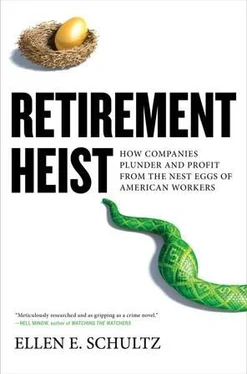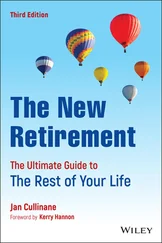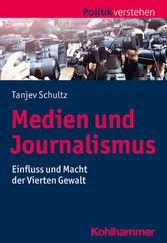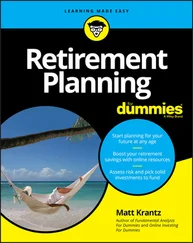The ability to convert pension benefits that would have been paid out to retirees over the coming decades into immediate profits for shareholders, today, changed the game: Pension plans weren’t just piggy banks to tap for cash. They were also cookie jars of potential earnings enhancements.
It works something like this: Let’s say a person earns $1,000, but he and his employer agree that he won’t be paid until next year. Under FAS 87, this IOU is a debt, which the employer records on his books: Deferred compensation, $1,000.
But what if the employer decides to cut the employee’s salary to $600 after the company has already recorded this debt on his books? Two things happen. The following year, the employer pays only $600—a cash savings of $400—and enjoys a secondary benefit: It has reduced its debt by $400. Under accounting rules, a forgiven debt is recorded as a gain, and boosts income.
To see how this plays out in the retirement heist, add a few zeros to the $400 and think of the deferred pay as a pension: You’re earning it today, but it will be paid later. Add ten thousand colleagues and the resulting obligation is billions of dollars. Reducing that obligation by $400 million generates gains.
There’s nothing magical about these accounting rules. What made pension debt different from other kinds of debt was that it was easier to erase. A company that borrows $100 million to build a factory can’t later wave a wand and make the debt go away; it can restructure the debt, or shed it in bankruptcy, but otherwise it’s sticking around.
Pensions are different. Companies have a lot of leeway to change the benefits, and thus the size of the pension debt—but not all of it: A company can’t touch the retirees’ monthly checks. And it can’t take away amounts people have already earned. But it can slow the growth of their pensions or halt it altogether by freezing the plans or laying off workers. This explains why, even when a pension plan has plenty of money, a company will profit if it cuts benefits.
It didn’t take benefits consultants long to realize that every dollar a company had promised a retiree—for pensions, prescription drugs, dental coverage, life insurance, or death benefits—was the equivalent of a dollar that could potentially be added to a company’s income. Suddenly, the $1 trillion that companies owed three generations of employees and retirees for pensions and retiree health benefits became potential earnings enhancements. Cuts generate gains, which lift earnings, which help the stock price, which boosts the compensation of the executives whose pay is based on performance. What CFO could resist that?
Not too many, and not for long. By the late 1990s, roughly four hundred large companies, most of which had well-funded or overfunded pension plans, had cut pension benefits, primarily by changing to a less generous cash-balance plan, which for many older workers was no different from freezing their pensions.
Pension managers faced a fresh conflict of interest: Should they manage the plans for the benefit of shareholders (and themselves) or for the benefit of retirees? Pension law requires that the plan be managed for the “exclusive benefit” of its participants. But on this point, pension law is like a toothless dog: It might sound scary, but it has no bite. Short of outright theft of pension assets, employers have been fairly free to make a lot of self-interested decisions when it comes to managing pensions.
Accounting professors at Cornell and the University of Colorado examined hundreds of companies that had converted their pensions to a cash-balance formula and found that the average incentive compensation for the chief executive officers jumped to about four times salary in the year of the pension cut, from about three times salary the year before. When companies didn’t change their pensions, CEO pay also didn’t change much. “You could have real economic wealth transfers away from employees,” concluded Julia D’Souza, a Cornell associate professor of accounting and lead author of the study.
Gains from benefits cuts were only one way the pension plans were lifting earnings. The investment returns in the plan were another. Under the old system, employers got only one benefit from the investment returns in the pension plan: If the investments did well, the company would have to contribute less to the plan to keep it well funded.
Under the new rules, employers got a second benefit: If investment returns on pension assets exceed the pension plans’ current costs, a company can report the excess as a credit on its income statement. Voilà: higher earnings. The bigger the pool of assets, the greater the potential gains.
This gave employers an incentive to cut benefits, even when the plan had a surplus. By the end of the decade, ten of the twelve companies with the most pension income had cash-balance or similar benefits-reducing pension plans. In 1998, Bell Atlantic Corp.’s pension plan produced a $627 million pretax credit for the company, and GTE Corp. reaped a $473 million pretax credit. US West, Boeing, IBM, and Ameritech had pension income ranging from $100 million to $454 million.
The desire for pension income also encouraged employers to increase stock holdings in the pension plans, in an effort to generate more income. The percentage of pension assets invested in stocks rose from 47 percent of assets in 1990 to more than 60 percent since the mid-1990s. A peculiar result of the accounting rules was that, instead of earnings driving the stock price, the stock market was driving earnings. In 1998, more than $1 billion of GE’s pretax profit of $13.8 billion came from the pension plans. Caterpillar Inc. scored a $183 million credit. At Northrop Grumman Corp., 40 percent of first-quarter pretax profit was attributable to the surplus. USX–U.S. Steel Group would have reported a first-quarter loss except for its overfunded pensions.
In the euphoria of the bull market, few analysts noticed that a big chunk of company profits was coming from the pension plans. Patricia McConnell, a senior managing director at Bear Stearns, was one of the few who noticed the trend. Concerned that investors didn’t understand that pension income was the result of smoke and mirrors, not improved sales or some other tangible achievement, she conducted an eight-month study and found that pension income accounted for 3 percent of the operating income of the S&P 500 companies in 1999. At some, it made a big difference. Without pension income, the income at People’s Energy, Westvaco, U.S. Steel, and Boeing would have been 20 percent to 30 percent lower. Northrop Grumman’s income would have been 43 percent lower.
Pensions not only generated profits; they also became tools to manage earnings, thanks to the enormous control employers had over the size and timing of pension profits. Need to lift the stock price before a merger? About to miss earnings targets by a few cents per share? No worries: The pension plan could get you there. The new accounting rules gave a whole new meaning to the words “pension fund management.”
The mechanics aren’t that complicated. Pension managers make a number of assumptions when they estimate the size of their pension liability, such as how long employees will work, what their annual pay increases are likely to be, whether they’re married, and how long they’ll live. One of the most powerful assumptions used to determine the size of the pension obligation is the “discount rate.” A lower discount rate produces a higher liability, because if a company assumes that the assets in the pension plan will grow at a rate of 5 percent a year, it will need more money in the fund today than if it’s assumed to grow by 7 percent.
Читать дальше












